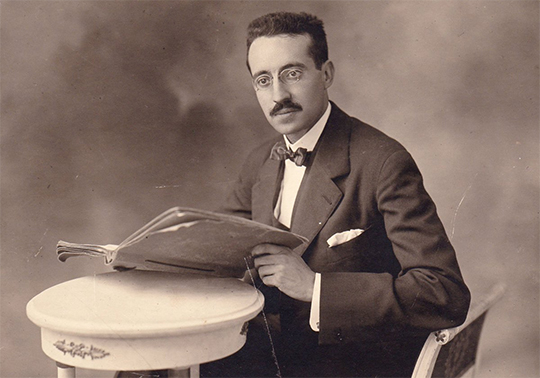
The Cultural Centre La Nau hosts tomorrow, Thursday 15 December, at 19:00, the premiere of the documentary which addresses the leading figure of Joan Peset Aleixandre. ‘Peset, un home bo. Metge, rector i republicà’ (‘Peset, a great man. Doctor, principal and republican’) is the first documentary carried out about the doctor, scientist and principal of the UV, in the 75th anniversary of his execution by the Franco regime and in the 130th anniversary of his birth.
The presentation of the documentary, which will be held in the Aula Magna, will count on the interventions of Antonio Ariño, vice-principal for Culture and Equality of the UV; Natalia Castellanos Peset, Peset’s great-granddaughter; Josep Lluís Barona, full university professor of History of Science of the UV; and Matilde Alcaraz, one of the scriptwriters of the documentary.
The documentary film addresses the leading figure of Joan Peset Aleixandre, a project in which the Peset family, who will attend the premiere, participates and directly collaborates. The documentary is an initiative of the audiovisual company Documentart, in which they have collaborated the UV and the Rector Peset Hall of Residence of the institution. Matilde Alcaraz y Santiago Hernández have directed the documentary and have carried out the script. The production and post-production have been made by Josevi Marco; the director of photography is Miguel Ángel Jiménez and the person in charge of adding the soundtrack, Vicente Chust.
The documentary provides a great quantity of unpublished material among which the last interview to the principal Peset’s son can be highlighted. The interview to Juan Peset Llorca was carried out by his granddaughter Natalia Castellanos, who has given it for the first time to this documentary. It is the first time Juan Peset Llorca openly talks about the time he spent with his father. The relationship between the granddaughter and the grandfather gives emotional honesty to the story and shows a mutual understanding difficult to share if it wasn’t the situation of a grandfather telling the truth in front of his granddaughter.
In fact, Peset’s son tells in this interview that, in addition to the complaint which was lodged by a group of Valencian Falangists, among whom we could find Marco Merenciano, some economic reasons related to the Peset laboratory were also the reasons which led to the death sentence of the principal. Specifically, it is mentioned the economic interest to appropriate the laboratory business. Both the son and the researcher of Peset’s life, Felip Martínez, point to professional ‘envy’ due to the fact that the laboratory was a very profitable business.
Peset’s son testimony reconstructs the image of Peset as husband and father of three sons and shows what meant for his family his decision of working in politics in such a tumultuous period. Juan Peset recalls how he arrived in Alicante with his father, his brothers and Ricardo Muñoz Suay, who was his godson.
The son describes how he accompanied his father to Alicante to embark on a boat that never arrived, the suffering they went through in the concentration camps of the Almendros in Alicante, in Albatera and later in Portacoeli. In the documentary the family tells the tragedy that entailed his prosecution, going through the city of Valencia pleading for his reprieve and finally the moment of his shooting in the firing line of Paterna on 24 May of 1941.
The documentary is articulated using the testimonies of prestigious researchers, historians and full university professors of Medicine and History of Science of the UV, who help to depict the scientific, university and political profile of doctor Peset.
His facet as university professor is reconstructed with another exceptional testimony, the one of the republican teacher Alejandra Soler, who was a friend of Peset and aged 103 years old remembers the significance of doctor Peset for those university students.
The poems that Estellés dedicates to his memory form a narrative corpus in the documentary. The lines of ‘L’ofici permanent a la memòria de Joan Peset’ are recited by the granddaughter of Vicent Andrés Estellés, Isabel Anyó Andrés, in front of the wall of the Paterna’s cemetery where Peset was shot.
The documentary also reconstructs the whole process against Peset using the documents preserved in the Military Archive of the Ministry of Defence in Madrid. These documents are shown in the documentary. It is surprising the small quantity of proofs to sentence the principal to death since most testimonies declared on his behalf.
The doctor and scientist Juan Bautista Peset Aleixandre was born in Godella on 2 July 1886 and died shot on 24 May 1941 in Paterna after an urgent summary proceeding. Even though he didn’t stand out politically until the end of the Second Republic, the fact of leading the lists of Valencia for the Frente Popular and being the member of parliament most voted by his constituency in February 1936, was evident enough for the Military Court to sentence him to death.
The personality of the one who was principal of the UV is of an intellectual with five degrees, three doctorates, his dedication to public hygiene or his work in the field of research.





